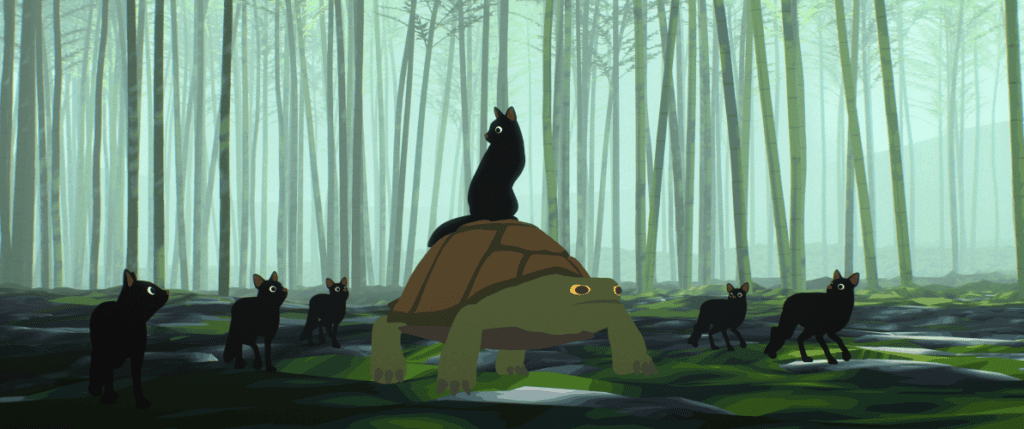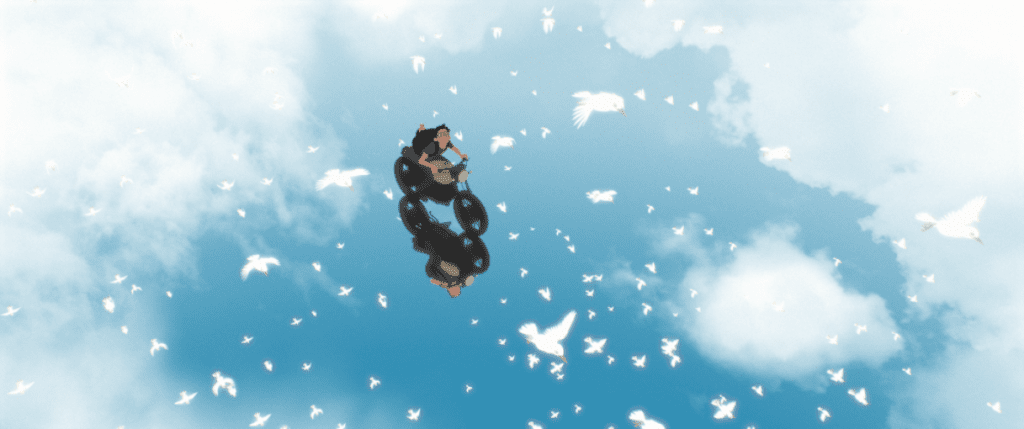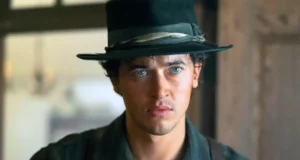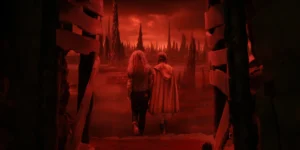Summary
A marvelous animated film about a boy traveling alone, from a Latvian multi-media auteur. Plenty to enjoy, for children and adults alike.
Away is about an unnamed boy making a long journey across a wild and varied island. Yes, it is that simple; but that simplicity is what allows the rich and beautiful atmosphere the space to move the viewer.
Away has such a slight plot that it is naturally riddled with unanswered questions and intriguing sights. When we first see the boy, he is hanging from a tree by a parachute, apparently in the middle of a desert; there are no clues whatsoever about how he came to be there, nor what the huge black figure is that lumbers towards him. The film’s blurb tells us he (and a little bird) are “trying to get back home”, but honestly there’s nothing there on the screen that declares his destination to be his home. Within minutes of the film starting, though, I found myself more than happy to simply follow the journey without any need or care for context.
There is a lot more to Away than the story, of course: there has to be. Inspiration can be found in the young lad’s resilience, perseverance, and the unspoken connections he formed with the creatures he encountered along the way. He seemed to be at ease in all of the environments he traveled through, whether snowy mountains, forest, or water; so much so, that I almost expected him to make a home in nature. At no point did he despair that his apparent quest was too arduous, and neither did he appear lonely. Away spoke to me as a person in isolation at present, and also made me crave the outdoors.
Like many animations (Over the Garden Wall being a prime example), Away can be enjoyed as an adventure story, a dream, an analogy, or a treat for the ears and eyes. There are some obvious interpretations here and there, but I understand writer/director Gints Zilbalodis did not intend any particular metaphors to be found within. It wouldn’t surprise me if other feelings arise when I watch it again (which I surely will), but this evening what it gave me was a kind of onwards-and-upwards encouragement.

The quality of the computer animation was even simpler than the plot, but it was so varied and beautifully presented that it didn’t matter in the slightest. The rich landscapes and animal life were somewhat reminiscent of Ghibli films, but the animation style was almost like being in a video game. The camera view moved almost constantly so that every scene was vibrant and drew me alongside the young traveler: I was with him all the way. Hand in hand with the lush visuals was the wonderful use of sound. I don’t know how it was done, but the creaking of the wooden bridge and the rumbling motorbike engine seemed crisp enough to confirm I was right there. And when neither silence nor sound effects are called for, music arrives; sometimes dramatic, sometimes charming, but incredibly good throughout. Both the sights and sounds lifted me out of this world and into Away, like a perfect meditation.
I’ve not said much about the characters so far, apart from the central boy’s perseverance. The animals he meets have personalities too: they are neither part of the background nor chirpy scene-stealers. The little yellow bird which joins the boy for a good deal of his journey (and who made me laugh a couple of times) looks up to the flock of birds in the sky and gradually believes he is strong enough to join them. When the boy is thirsty, he follows wild cats to water, and having felt communion with him, they all curl up to sleep. And then there’s the huge black something which relentlessly follows.
Here’s something I’ve not mentioned until now: not a single word was spoken in the entire film. It was eye-opening to find another film in which speech was simply unnecessary (the other being Anonymous Animals), because the mood was enough without it, and no explanation was required beyond what was shown on screen. Besides, any viewer of any language can enjoy Away: it’s already been a hit in Japan.
Everything I’ve outlined so far may seem even more remarkable when considering that one person was behind all of it. Gints Zilbalodis, a filmmaker half my age from Latvia, not only wrote and directed Away but also produced and animated it all himself, and created the score too. This was his first feature film following several shorts, and he’s already made a start on his next film.
Away is out now on Apple TV, iTunes, Sky Store, Amazon, Google, Microsoft, Rakuten, Sony and Curzon Home Cinema.




